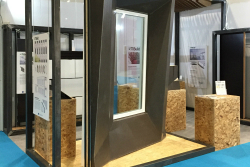Revolutionising the construction sector
External building facades, internal partitions and suspended ceilings which form an integral part of building structures are currently characterised by very high embodied energy. Biocomposites overcome the energy drawbacks of current materials such as steel, brick, concrete and even glass fibre-reinforced plastic. However, susceptibility to moisture and biodegradation decreases service life, particularly for outdoor applications. The EU-funded project BIOBUILD (High performance, economical and sustainable biocomposite building materials) was launched to address these challenges. The main objective was to reduce embodied energy by at least 50 % over current materials with no increase in cost. Consortium members selected four case studies and produced demonstrators. The BIOBUILD newsletter publicised the choice of parts, required performance, and the designs and manufacturing processes – all supported by life-cycle assessments to reduce the embodied energy of the parts. Scientists used two different resins: an unsaturated polyester with monomers partially derived from agricultural feedstocks, and a polyfurfuryl alcohol resin produced from agricultural waste rich in hemicellulose. The reinforcement was strong cellulosic fibres from the stems of flax and jute plants. To improve the sustainability and performance of their biocomposites, the BIOBUILD partners introduced a number of advances. They developed treatments and coatings to make the fibres moisture resistant and improve their adhesion to the polymer. Fire retardant additives and coatings were used to raise the flame resistance of the material, achieving EuroClass B for polyfurfuryl alcohol based laminates. The project also identified promising areas for further development work. Researchers formed an Industrial Interest Group. The contents of their meetings can be found on the project website. The project has also been widely publicised through postcards, flyers, academic papers and posters in addition to the project's newsletter. The project also exhibited at EcoBuild in London to display the new products to a wider audience. This is the leading trade fair for sustainable construction materials. On the road to success, BIOBUILD has won the 2015 JEC Innovation Award in the construction category. Scientists have demonstrated the world's first self-supporting facade panel for building construction made of biocomposites.
Keywords
Construction, building materials, biocomposites, embodied energy, polyfurfuryl alcohol







